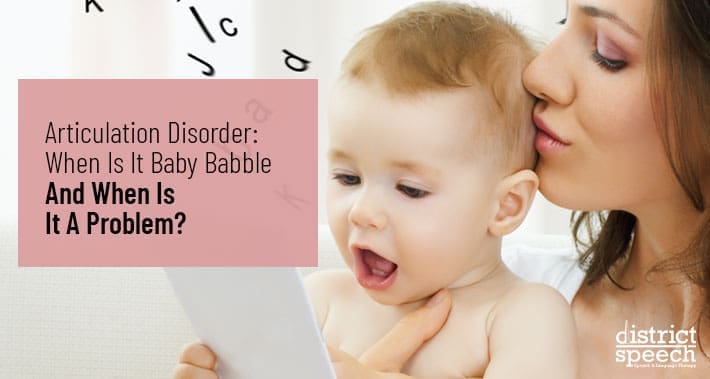
During their development, your child’s brain is taking in all kinds of new information.
In their early years, their brains will be especially busy learning all about language.
After all, it’s how we communicate and navigate throughout the world.
From work to personal life, we use language skills in virtually every aspect of our lives.
And it’s during childhood that we learn the majority of these skills.
Children learn language and the meanings of words through imitation and other forms of play.
RELATED: How Do Babies Learn Language?
RELATED: Why Is Play Important In A Child’s Development?
They hear words being spoken by the adults around them and then repeat those same sounds themselves in order to be understood.
However, this process doesn’t look the same for all children.
For instance, some children learn slower than others.
But all children say things incorrectly sometimes.
How can you tell the difference between a genuine articulation disorder, and a kid who’s just not quite getting a few words right?
In this article, we’ll help clarify by taking a look at what an articulation disorder is, and what it isn’t.
What Is Articulation Disorder?
Children learn sounds, and ultimately, language in distinct stages.
Generally speaking, these stages occur in the same order for most children.
A lot of their speech and language development has to do with articulation, or the way to pronounce certain sounds.
Early on, they learn sounds like p, m, and w.
These are simple sounds for a baby to make – it’s just mouth shapes, with little use of your tongue or teeth (or lack thereof, if you’re a baby).
It’s not until later that they’ll learn z, v, th, and other more complex sounds.
By four years of age, most children will be able to pronounce almost all speech sounds correctly.
Some conditions can affect your child’s ability to produce these more complex noises.
For instance, tongue tie can make it difficult for your child to make the necessary oral movements to produce these sounds.
Or, it could be a sign of an articulation disorder, also called a phonological disorder.
What Causes Articulation Disorder?
In some cases, genetics has to do with it – if you or your co-parent has an articulation disorder, it’s more likely your child will.
Gender also seems to play a role.
Like certain other forms of speech and communication deficits, boys seem to deal with articulation disorder more often than girls.
In other cases, it can have to do with a physical issue, like a cleft lip or cleft palate, or poorly formed jawbones or teeth.
It can also be a result of brain or nerve damage, as in the case of cerebral palsy or right hemisphere brain damage.
In some cases, we know that it has to do with the brain not sending through messages to the speech muscles properly.
This is called apraxia of speech.
RELATED: Getting Familiar With Speech Disorders: Childhood Apraxia Of Speech
When these same speech muscles function properly, but are merely weak, it is called dysarthria.
Other reasons for speech issues can be side-effects of specific conditions, syndromes, disorders, or injuries.
For instance, children with Down syndrome often struggle with articulation.
Unfortunately, though, for many cases of articulation disorder, we can’t pinpoint a cause.

Is It Articulation Disorder Or Just Baby Talk?
Children are not only in the process of learning, they also have creative minds that don’t always follow the rules of normal speech.
Make believe has been proven to be extremely beneficial to childhood development, for instance.
However, there is a difference between your child assuming a character’s ‘voice’ and being unable to pronounce words properly for a medical reason or a learned reason.
Let’s face it, children are already difficult enough to understand.
Your child might leave out or substitute words or sounds making it next to impossible to discern their meaning.
Since speaking is still new to them, they also make frequent mistakes with the positioning of their mouths.
As their speech muscles learn to form the right shape to create words, they may make a ‘w’ sound instead of an ‘r’ sound, for instance.
Other times, your child might leave out entire sounds or syllables, such as saying ‘nana’ instead of ‘banana’.
This is especially common amongst young children.
But if your child’s speaking is too difficult for you to understand at all, it might be time to consider
speech therapy for your child.
RELATED: When Should I Take My Child To An SLP? Red Flags For Speech & Language Development
In fact, it’s best to book an appointment for your child as soon as you suspect a problem.
Early intervention for children with speech disorders is critical.
Studies have shown that the longer a child goes without speech therapy for a speech disorder, the more difficult it will be to correct their speech disorder.
If your child is showing any of the following signs, it’s a good idea to book an appointment:
- If your child is speaking less or seems to be embarrassed by their speech issues
- If they are still difficult to understand by the age of four
- If they are challenged making certain sounds still at the age of six
- If they are still skipping or changing specific sounds by the age of seven.
How Can A Speech Therapist Help With Articulation Disorders?
A speech language pathologist is a trained, licensed professional who can help you navigate severe or mild speech problems that your child might be experiencing.
The speech therapist will identify the sounds that are difficult for your child to pronounce.
From there, they will help them get it right by showing them how to use their tongue or lips correctly.
They will then craft goals for your child to work on and will keep track of progress during sessions.
For example, they may help your child pronounce the ‘k’ at the end of kick.
Speech therapy is able to help improve many speech problems, especially if started earlier in a child’s life.
Book An Appointment With District Speech
Have you noticed that your child is particularly difficult to understand, even to the people closest to them?
Or, have you been told by others that your child is more difficult to understand than the average child their age?
Whether you and your family are the only ones who can understand your child’s speak, or you’re just looking for more information on speech and childhood development, we can help.
At District Speech, we care about the quality of your child’s voice.
Communication is too important a gift to waste.
Book your appointment with District Speech today to help your child find their voice.
1300 I St NW, Suite 400 E,
Washington, DC 20005
- https://g.page/districtspeech
District Speech and Language Therapy specializes in speech therapy, physical therapy, and occupational therapy solutions, for both children and adults, in the Washington D.C and the Arlington Virginia areas.